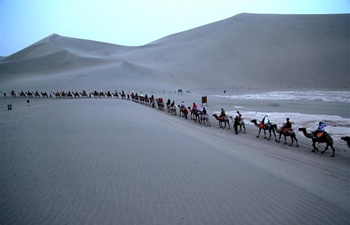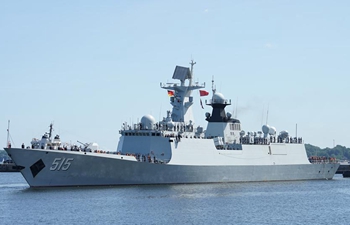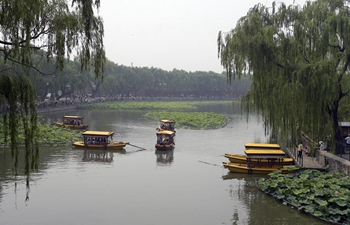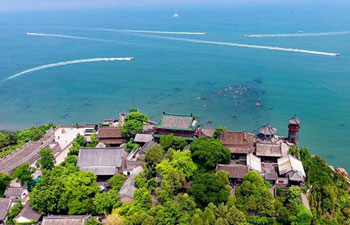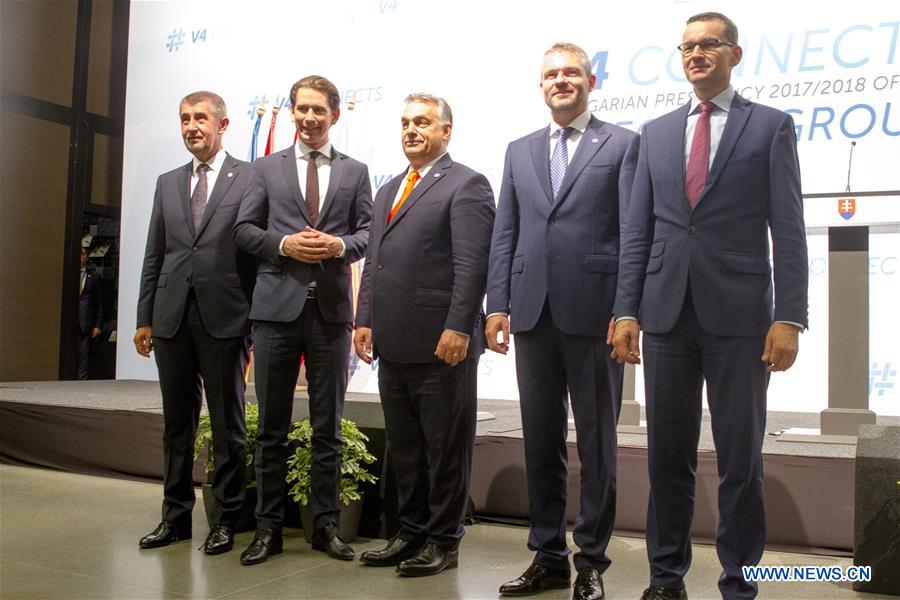
Czech Prime Ministers Andrej Babis, Austrian Chancellor Sebastian Kurz, Hungarian Prime Minister Viktor Orban, Slovak Prime Minister Peter Pellegrini and Polish Prime Minister Mateusz Morawiecki (L-R) attend a joint press conference following their meeting in Budapest, Hungary, on June 21, 2018. The prime ministers of the Visegrad countries (Poland, Hungary, the Czech Republic and Slovakia) and Austria said Thursday that Europe should be able to defend its borders. (Xinhua/Szilard Voros)
BUDAPEST, June 21 (Xinhua) -- The prime ministers of the Visegrad countries (Poland, Hungary, the Czech Republic and Slovakia) and Austria said Thursday that Europe should be able to defend its borders.
"The Visegrad countries and Austria agree that Europe should be able to defend its borders and guarantee safety for its citizens," Hungarian Prime Minister Viktor Orban told journalists following the meeting of the prime ministers of the Visegrad countries and the Chancellor of Austria.
Orban added that the relationship between the member states of the European Union should be characterized by "cooperation and not confrontation."
"According to this, the focus should be put on questions in which there is an agreement, such as the protection of the external borders and the setting up of refugee camps to deal with migrants outside of the territory of the EU, but questions where there is disagreement such as the relocation scheme of the migrants should be dropped," Orban said.
The meeting of theses central European states comes amid high tensions within the European Union's member states that have been profoundly divided over the question of migration and migrants.
SUMMITS
In order to find a solution ahead of the official EU summit next Thursday, the states mainly concerned by migration have prepared an unofficial mini-summit scheduled for this Sunday.
The meeting on Sunday goes against the traditions of the EU, and the appropriate forum for EU leaders has been already convened for next Thursday, that is why the Visegrad countries will not attend the mini-summit on Sunday, Orban said.
"The Visegrad countries will present their position next Thursday at the official meeting," Orban said.
Orban also said that ahead of next week's summit, President of the European Council Donald Tusk would come to Budapest on Friday and discuss the topics of next week's meeting.
Orban's Polish counterpart Mateusz Morawiecki said that Sunday's meeting was unacceptable, adding, "We are not going to attend, they only want to re-heat a proposal."
AUSTRIA
The four Visegrad leaders were joined at the meeting by Austrian Chancellor Sebastian Kurz, who has recently added his voice to calls for a tougher migration policy.
"We have to have a Europe capable of defending us," Kurz declared.
"We have to strengthen (border agency) Frontex, to protect our external border and ensure internal freedom," he said.
Kurz is sharing the traditional hardline stance on migration, rejecting any suggestion of mandatory refugee resettlement among EU members.
He said that Austria would like that the discussion about the migrants focus on the common defense of the external borders and the setting up of hot spots and not the relocation of the illegal migrants within Europe.
"Without safe external borders, we cannot keep our internal borders open," Kurz explained.
Czech Prime minister Andrej Babis underlined that the Visegrad countries were very closely alligned regarding the question of migration."Since a long time, our opinions are the same regarding migration, and it is my conviction that southern European countries such as Spain, Italy, Malta and Greece should be defending the continent," he said.
At the end of the press event, Orban handed over the presidency of the Visegrad countries to Slovakia from the first of July.
"As Austria takes over the presidency of the EU on the first of July, Slovakia will take over the presidency of the Visegrad countries the very same time, meaning that we are going to work shoulder by shoulder and Slovakia would like to assist Austria in its duties," Slovak Prime Minister Peter Pellegrini said.









